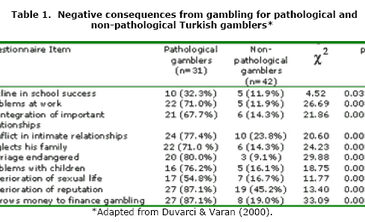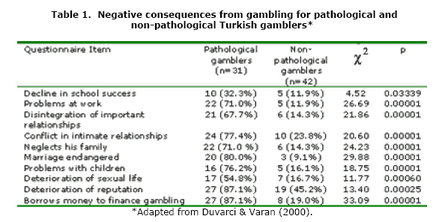Throughout the past two decades the Turkish government has legalized and encouraged gambling for its own financial gain (Duvarci & Varan, 2000). However, state-sponsored gambling activities are limited to lotteries, lotto, and horse betting. As such, illegal gambling in Turkey occurs in the kahvehane (i.e., coffee house), where card gambling is popular. Research conducted by Duvarci and Varan (2000) sought to discover the descriptive features of pathological (i.e., level 3) Turkish gamblers.
The research sample consisted of seventy-three men who gambled at least once per week on horse races or cards; 72.6% (n=53) were recruited from kahvehanes, 4.1% (n=3) from off-track offices, and 23.3% (n=17) from a local hospital. To identify gambling pathology, the Turkish version (Duvarci, Varan, Coskunol, & Ersoy, 1997) of the South Oaks Gambling Screen (SOGS; Lesieur & Blume, 1987) was administered; non-pathological gamblers were the control group. A questionnaire on the history of gambling involvement, chasing, craving, cognitions, emotions, and negative consequences of gambling was also administered.
Results indicate that pathological Turkish gamblers are significantly more likely than non-pathological Turkish gamblers to use gambling as a means to escape problems (80.6% vs. 33.3%) and uncomfortable social situations (45.2% vs. 14.3%; Duvarci & Varan, 2000). Moreover, pathological gambling in Turkey is partly maintained by chasing losses and craving. Indeed, 80.6% of pathological gamblers versus 38.1% of non-pathological gamblers took gambling risks to recover losses. Between 55.1 to 67.7% of pathological gamblers surveyed craved gambling, compared to 14.6 to 21.4% of non-pathological gambling (Duvarci & Varan, 2000).
Duvarci and Varan (2000) also discovered a significant correlation between Turkish gamblers’ perception of their gambling behavior and their gambling pathology diagnosis; while perhaps not identifying it as such, pathological Turkish gamblers perceive their gambling behavior as pathological. Additionally, pathological Turkish gamblers (90.3%) overwhelmingly report sad and/or angry feelings when they lose at gambling. Approximately 74% felt guilty for gambling, compared to approximately 38% of non-pathological gamblers. Table 1 shows significant differences between pathological and non-pathological Turkish gamblers regarding gambling’s negative consequences.
The research conducted by Duvarci and Varan (2000) suggests that pathological gamblers in Turkey present with diagnostic features similar to those in other countries. However, this research must be considered exploratory and biased by certain methodological limitations. For example, the research sample was small and consisted only of male participants who gamble only on horses or cards. As such, results might not generalize to all male Turkish gamblers, including those who wager on other legal and illegal gambling activities; research results definitely cannot generalize to female Turkish gamblers. Additionally, the data collected derives entirely from self-report. Data contamination via subject self-misrepresentation is possible. Furthermore, the study’s results might reflect only the attitudes of the particular region of Turkey within which the research was conducted. Future research by Duvarci and Varan should consider examining possible cultural, religious, and political influences that might affect the prevalence of pathological and problem gambling among the entire Turkish population.
References
Duvarci, I., & Varan, A. (2000). Descriptive features of Turkish pathological gamblers. Scandinavian Journal of Psychology, 41, 253-260.
Duvarci, I., Varan, A., Coskunol, H., & Ersoy, M. A. (1997). DSM-IV and South Oaks Gambling Screen: diagnosing and assessing pathological gambling in Turkey. Journal of Gambling Studies, 13(3), 193-206.
Lesieur, H. R., & Blume, S. B. (1987). The South Oaks Gambling Screen (SOGS): a new instrument for the identification of pathological gamblers. American Journal of Psychiatry, 144, 1184-1188.
The WAGER is a public education project of the Division on Addictions at Harvard Medical
School. It is funded, in part, by the National Center for Responsible Gaming, the
Massachusetts Department of Public Health, the Addiction Technology Transfer Center of
New England, the Substance Abuse and Mental Health Services Administration, and the
Center for Substance Abuse Treatment.





